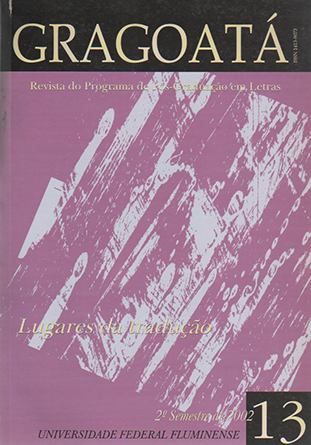A tradução de textos técnicos e jornalísticos na direção inglês -> português
Palavras-chave:
Estudos tradutológicos baseados em corpus, Tradução técnica, Tradução jornalística, Análise contrastiva, Tipologia textual.Resumo
Um processo de descrição e análise do fenômeno tradutório em textos técnicos e jornalísticos, comparados de maneira sistemática e com bases científicas, pode fornecer subsídios para obter-se um padrão básico de quais modalidades tradutórias ocorreriam com mais frequência nessas duas tipologias textuais na direção inglês -> português. Por essa perspectiva, conforme indiquem maior ou menor semelhança ou distanciamento nesse par de línguas, as incidências poderiam evidenciar algumas tendências existentes nas traduções técnicas e jornalísticas. A fim de compararmos os doze textos de partida e os respectivos textos de chegada, aplicamos o modelo AUBERT (1984, 1997). Diante da regularidade constatada no levantamento de dados, mostra-se viável a existência de uma ordem predominante para as modalidades de maior frequência: tradução literal, transposição e modulação. Com base nos resultados, parece destacar-se, na tradução de textos técnicos e jornalísticos, uma maior propensão para a literalidade do que para reelaborações semântico-estilísticas, indicando, assim, uma menor individualidade do tradutor diante desses dois tipos de texto. Todavia, uma atuação mais restrita do tradutor não implica um menor grau de dificuldade, posto que, muitas vezes, pode ser bastante intrincada a tentativa de encontrar a correspondência adequada para determinados termos quer da tecnologia de ponta quer da tradução de textos jornalísticos em virtude da diversidade do universo temático e do estilo condensado, particularmente das manchetes.
Downloads
Downloads
Publicado
Edição
Seção
Licença
AUTORIZAÇÃO
Autores que publicam em Gragoatá concordam com os seguintes termos:
Os autores mantêm os direitos e cedem à revista o direito à primeira publicação, simultaneamente submetido a uma licença Creative Commons Atribuição 4.0 Internacional (CC BY 4.0), que permite o compartilhamento por terceiros com a devida menção ao autor e à primeira publicação pela Gragoatá.
Os autores podem entrar em acordos contratuais adicionais e separados para a distribuição não exclusiva da versão publicada da obra (por exemplo, postá-la em um repositório institucional ou publicá-la em um livro), com o reconhecimento de sua publicação inicial na Gragoatá.
A Gragoatá utiliza uma Licença Creative Commons - Atribuição CC BY 4.0 Internacional.











